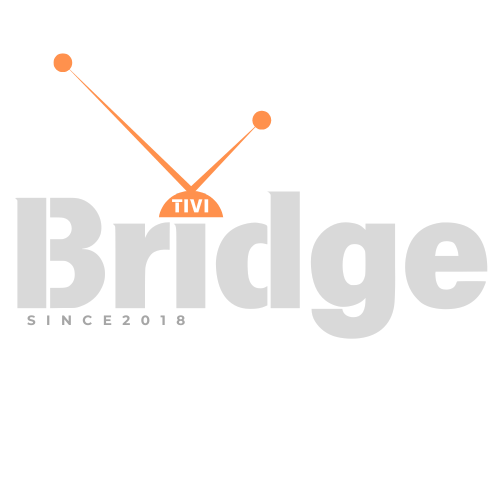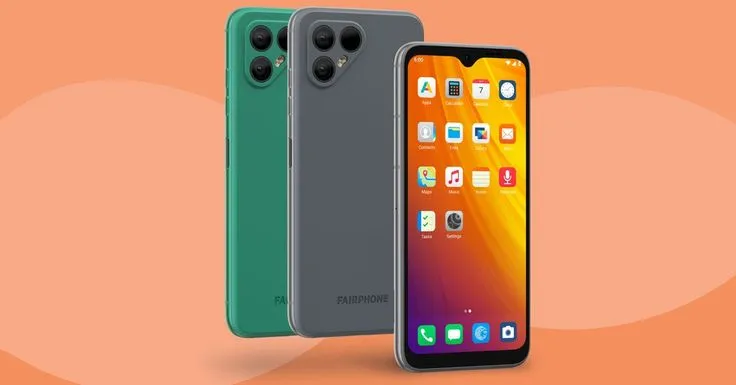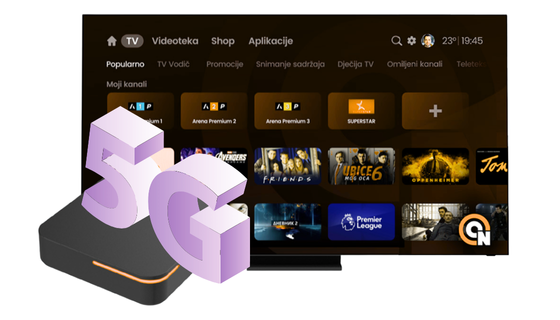Role of 5G in IPTV Streaming
Role of 5G in IPTV Streaming – The way we consume television content has undergone a remarkable transformation in recent years. Gone are the days when we were tethered to traditional cable or satellite TV systems. Today, Internet Protocol Television (IPTV) has revolutionized how we access and enjoy our favorite shows, movies, and sports events. But what happens when you combine IPTV with the blazing speeds and revolutionary capabilities of 5G technology? What is the role of 5G in IPTV streaming, and how does it transform the viewing experience?
5G technology represents the fifth generation of mobile network technology, promising speeds up to 100 times faster than 4G, with significantly reduced latency and increased connection density. These advancements have profound implications for IPTV streaming services, which rely heavily on stable internet connections and sufficient bandwidth. Whether you’re a sports enthusiast using sport IPTV services or someone who loves the flexibility of smart IPTV systems, 5G is set to elevate your viewing experience to unprecedented heights.
In this comprehensive guide, we’ll explore the transformative role of 5G in IPTV streaming, delving into how this cutting-edge technology is reshaping the landscape of digital entertainment. From enhancing streaming quality to enabling new interactive features, the marriage of 5G and IPTV is opening doors to exciting possibilities that were once considered futuristic fantasies.
Understanding IPTV and Its Current Challenges
What Exactly Is IPTV?
IPTV (Internet Protocol Television) delivers television content over internet protocols rather than through traditional terrestrial, satellite, or cable TV formats. Unlike conventional TV broadcasting, IPTV allows users to stream media content on-demand, offering unprecedented flexibility and personalization.
With IPTV services, viewers can access:
- Live TV channels
- Video-on-demand content
- Catch-up TV services
- Interactive applications
- Specialized content through providers like reseller IPTV services
Smart IPTV platforms have gained immense popularity due to their user-friendly interfaces and compatibility with various devices. Many viewers use IPTV m3u files to organize and access their preferred channels and content, creating personalized viewing experiences.
Current Limitations of IPTV Streaming
Despite its revolutionary nature, IPTV streaming still faces several challenges that impact the quality of service:
- Bandwidth Constraints: High-definition and 4K content require substantial bandwidth, which isn’t always available through existing internet connections.
- Latency Issues: Delays in data transmission can cause buffering, especially during live events such as online sports 2025 tournaments.
- Connection Stability: Traditional networks often struggle with maintaining stable connections, particularly in densely populated areas or during peak usage times.
- Quality of Service: Maintaining consistent video quality across different network conditions remains challenging.
- Device Limitations: Not all devices can process high-quality streams efficiently, leading to performance issues.
These limitations have prevented IPTV from fully realizing its potential, especially for bandwidth-intensive applications like live sports streaming or 4K content delivery. This is precisely where 5G technology steps in as a game-changer.
The Revolutionary Impact of 5G on IPTV Streaming
Unprecedented Speed and Bandwidth
The most obvious benefit of 5G for IPTV streaming is the dramatic increase in speed and bandwidth capacity. With theoretical peak speeds of up to 20 Gbps (compared to 4G’s 1 Gbps), 5G provides the perfect foundation for seamless streaming of high-definition content.
What is the role of 5G in IPTV streaming when it comes to bandwidth? It essentially eliminates the bottleneck that has plagued streaming services for years. This enhanced capacity means:
- Uninterrupted 4K and 8K Streaming: Viewers can enjoy ultra-high-definition content without buffering or quality degradation.
- Multiple Simultaneous Streams: Households can run several streams on different devices without experiencing slowdowns.
- Real-Time Content Delivery: Live events can be streamed with minimal delay, revolutionizing how we experience sports and news coverage.
For providers like TiviBridge, this means they can deliver premium content without worrying about network limitations, ensuring customers get the best possible experience regardless of the content quality.
Dramatically Reduced Latency
Latency – the delay between sending and receiving data – is another critical factor in streaming quality. 5G technology reduces latency to as low as 1 millisecond, compared to 4G’s average of 50 milliseconds. This 98% reduction transforms the streaming experience in several ways:
- Real-Time Interaction: Virtually eliminated delay enables truly interactive features during live streams.
- Synchronized Viewing: Multiple viewers can stay perfectly in sync during shared viewing experiences.
- Instantaneous Channel Switching: No more waiting when changing between channels or streams.
- Enhanced Live Sports Viewing: What is the role of 5G in IPTV streaming for sports fans? It means near-real-time transmission of live sporting events without the frustrating delays that plague current streaming solutions.
The best IPTV provider to watch all channels will leverage this reduced latency to create more immersive and responsive viewing experiences.
Enhanced Connection Density
5G networks can support up to 1 million connected devices per square kilometer, dwarfing the capabilities of previous generations. This revolutionary increase in connection density means:
- Reliable Service in Crowded Areas: IPTV streaming remains stable even in high-density housing, events, or urban centers.
- Consistent Quality: Network congestion becomes less of an issue, ensuring consistent streaming quality.
- Expanded Service Reach: More users can access high-quality IPTV services simultaneously.
For reseller IPTV businesses like those using the TiviPlanet platform, this expanded capacity means they can grow their customer base without compromising service quality.
Network Slicing for Optimized Performance
One of the most innovative features of 5G is network slicing, which allows operators to create multiple virtual networks within a single physical infrastructure. This capability has profound implications for IPTV streaming:
- Dedicated Bandwidth for Streaming: IPTV providers can secure guaranteed network resources.
- Quality of Service Guarantees: Providers can ensure consistent performance for their subscribers.
- Customized Network Characteristics: Different types of content can receive optimized network configurations.
This technology ensures that sport IPTV services, which require reliable, low-latency connections, can maintain perfect quality even during major sporting events when millions of viewers are streaming simultaneously.
Transforming the IPTV Viewing Experience Through 5G
Mobile Viewing Revolution
What is the role of 5G in IPTV streaming for mobile users? It’s nothing short of revolutionary. 5G eliminates the quality compromise previously necessary when streaming on mobile devices:
- True HD on Mobile: Crystal-clear high-definition streaming on smartphones and tablets.
- Stable Connections on the Go: Consistent streaming quality even while moving between cell towers.
- Reduced Battery Consumption: More efficient data transmission means less battery drain during streaming.
- Seamless Public Wi-Fi Alternative: 5G often provides better streaming quality than public Wi-Fi networks.
Smart IPTV applications can now deliver the same quality experience on mobile devices as on home systems, expanding where and how people consume content.
Enabling Advanced Interactive Features
The combination of high bandwidth and low latency enables a new generation of interactive features:
- Multi-Angle Viewing: Choose from multiple camera angles during live events.
- Real-Time Statistics and Information: Access instant data overlays during sports or educational content.
- Interactive Advertising: Engage with relevant, interactive ads without interrupting content.
- Social Viewing Experiences: Participate in synchronized watch parties with friends across different locations.
These features transform passive viewing into active engagement, providing value that traditional television simply cannot match.
Expanding Content Possibilities
What is the role of 5G in IPTV streaming when it comes to content innovation? It removes technical limitations that have constrained content creators:
- Virtual Reality Integration: Stream immersive VR content that places viewers “inside” the action.
- Augmented Reality Enhancements: Add informative or entertaining AR elements to traditional programming.
- Ultra-High Definition Standard: 8K resolution becomes viable for regular streaming.
- Multi-Stream Compositions: View multiple related streams simultaneously (e.g., different matches during a tournament).
Providers like IPTVBridge can leverage these capabilities to offer unique content experiences that differentiate them in the competitive streaming market.
5G Implementation for IPTV Providers and Users
Infrastructure Requirements
For IPTV providers looking to capitalize on 5G capabilities:
- Edge Computing Integration: Placing computing resources closer to users reduces latency further.
- Adaptive Bitrate Enhancements: Improved algorithms to take advantage of varying 5G speeds.
- Backend Scalability: Systems must handle the increased data throughput 5G enables.
- Security Upgrades: New protocols to protect the expanded attack surface.
These infrastructure investments are substantial but necessary to deliver on 5G’s promise for IPTV streaming.
User Equipment Considerations
To fully experience what 5G offers for IPTV:
- 5G-Compatible Devices: Smartphones, tablets, or dedicated streaming devices with 5G capabilities.
- Updated Smart TV Systems: Televisions that can integrate with 5G networks directly or through peripherals.
- Home Network Optimization: Even with 5G, local network configuration remains important.
- Appropriate Data Plans: 5G’s high bandwidth can consume data allowances quickly.
Users seeking the best experience should consider these factors when upgrading their equipment and service plans.
Implementation Timeline and Availability
What is the role of 5G in IPTV streaming in terms of current availability? While expanding rapidly, 5G deployment varies significantly by region:
- Urban Areas: Most major cities now have substantial 5G coverage.
- Suburban Expansion: Ongoing deployment throughout 2025 will bring 5G to most suburban areas.
- Rural Implementation: Remains challenged but with targeted solutions being deployed.
- Global Disparities: Developed regions are further along in implementation than developing nations.
For IPTV users, checking local 5G coverage maps and provider roadmaps helps set realistic expectations for service availability.
Looking for Premium Channels, Sports, and 4K Streaming?
Don’t miss out on these top-rated IPTV services – all at unbeatable prices!
🔥 TiviBridge – Ideal for sports lovers & international content
🎬 Iptvbridge – Perfect for live TV, movies & entertainment
💰 TiviPlanet – Best value for budget-conscious streamers
🚀 Start Your IPTV Business Today!
Get instant access to a powerful Reseller IPTV Panel with competitive pricing, advanced features, and 24/7 support. Join TiviBridge and grow your own IPTV empire with ease!
👉 Start your FREE trial now and elevate your viewing experience with seamless, high-quality streaming!
Business Models and Opportunities in 5G IPTV
New Revenue Streams for Providers
5G enables IPTV providers to explore new business models:
- Premium Quality Tiers: Offering guaranteed 4K/8K streaming as premium services.
- Interactive Add-Ons: Paid enhancements for interactive content experiences.
- Hyper-Local Content: Targeted regional programming made viable through network slicing.
- Specialized Sports Packages: Enhanced sport IPTV offerings with multi-angle viewing and statistics.
Reseller IPTV businesses can particularly benefit from these new revenue opportunities, as explained on TiviBridge’s reseller page.
Changing Consumer Expectations
What is the role of 5G in IPTV streaming from a consumer perspective? It’s raising expectations dramatically:
- Zero-Tolerance for Buffering: Consumers increasingly expect flawless streaming.
- Higher Quality Standard: HD is becoming the minimum acceptable quality.
- Feature-Rich Interfaces: Basic streaming is no longer enough; interactive elements are expected.
- Multidevice Consistency: Same experience across TV, mobile, and other devices.
IPTV providers must adapt to these elevated expectations to remain competitive.
Competitive Landscape Evolution
The 5G revolution is reshaping competition in the IPTV space:
- Traditional Telecom Advantage: Companies with existing mobile infrastructure have a head start.
- Tech Giants’ Expansion: Major technology companies are leveraging 5G for content delivery.
- Niche Provider Opportunities: Specialized content delivered with 5G quality creates space for focused providers.
- Global Competition Increase: Reduced technical barriers enable more cross-border competition.
This evolving landscape creates both challenges and opportunities for established and emerging IPTV businesses.
Challenges and Limitations of 5G for IPTV
Coverage and Implementation Hurdles
Despite its potential, 5G faces implementation challenges that affect IPTV streaming:
- Uneven Deployment: Urban areas receive priority, creating a digital divide.
- High-Frequency Limitations: The highest-speed 5G bands have limited range and poor penetration.
- Infrastructure Cost: The expense of deployment slows expansion in many regions.
- Regulatory Barriers: Varying regulations impact deployment schedules and capabilities.
These factors mean that what is the role of 5G in IPTV streaming varies significantly based on location and infrastructure.
Cost Considerations
The economics of 5G IPTV present challenges:
- Provider Investment Requirements: Substantial capital expenditure needed for infrastructure.
- Consumer Equipment Costs: New devices required to take full advantage of 5G capabilities.
- Data Plan Implications: High-quality streaming consumes substantial data allowances.
- Price Sensitivity: Market resistance to premium pricing despite enhanced quality.
Balancing these cost factors with service quality is crucial for sustainable business models.
Technical Limitations
Even 5G has constraints that affect IPTV streaming:
- Indoor Penetration Challenges: Higher-frequency 5G signals struggle to penetrate buildings.
- Weather Sensitivity: Millimeter wave 5G can be affected by heavy rain or fog.
- Device Battery Impact: High-speed streaming can drain mobile device batteries quickly.
- Processing Requirements: Some devices lack the processing power for enhanced features.
Understanding these limitations helps set realistic expectations for both providers and users.
The Future of 5G and IPTV Integration
Upcoming Technological Enhancements
The 5G-IPTV relationship continues to evolve with emerging technologies:
- 6G on the Horizon: Research already underway for the next generation of connectivity.
- AI-Driven Optimizations: Machine learning improving network efficiency and content delivery.
- Expanded Edge Computing: Further latency reductions through distributed processing.
- Advanced Compression Standards: New codecs maximizing quality while minimizing bandwidth.
These developments will further enhance what is the role of 5G in IPTV streaming over the coming years.
Predicted Market Evolution
Industry analysts project significant changes in the IPTV landscape due to 5G:
- Accelerated Cord-Cutting: Faster transition away from traditional TV services.
- Consolidation Wave: Mergers and acquisitions as companies position for 5G advantage.
- Specialized Content Proliferation: More niche content made viable by efficient delivery.
- Global Market Homogenization: Reduced technical barriers leading to more international competition.
These trends present both opportunities and challenges for current market participants.
Integration with Emerging Technologies
5G-powered IPTV will increasingly integrate with other cutting-edge technologies:
- IoT Ecosystem Connection: Smart home integration with viewing experiences.
- Extended Reality Content: Blending traditional viewing with VR/AR elements.
- Voice and Gesture Control: Natural interfaces replacing traditional remotes.
- Personalization Through AI: Highly customized content and recommendations.
These integrations will continually redefine what is the role of 5G in IPTV streaming as the technology matures.
FAQs About 5G and IPTV Streaming
How much faster is 5G compared to 4G for IPTV streaming?
5G offers speeds up to 100 times faster than 4G, with theoretical maximums around 20 Gbps compared to 4G’s 1 Gbps. For IPTV streaming, this translates to near-instantaneous loading, higher resolution capabilities, and the elimination of buffering for most content.
Will 5G completely replace home broadband for IPTV services?
While 5G has the potential to replace home broadband in some scenarios, it’s more likely to complement rather than completely replace wired connections in the near term. Fixed 5G services are becoming competitive alternatives, especially in areas with limited fiber or cable infrastructure.
What is the role of 5G in IPTV streaming for rural areas?
5G presents both challenges and opportunities for rural IPTV streaming. While high-band 5G has limited range, low and mid-band 5G, along with specific rural deployment strategies, can significantly improve connectivity in previously underserved areas, expanding IPTV access.
How will 5G affect IPTV subscription costs?
The impact on costs will be mixed. The improved efficiency may reduce delivery costs for providers like TiviBridge, but the enhanced features and quality may justify premium pricing. Competition will likely keep basic service prices in check while creating premium tiers.
Can existing IPTV setups benefit from 5G, or is new equipment required?
Most existing IPTV systems will require some upgrades to fully benefit from 5G. This might include new streaming devices, updated smart TVs, or 5G modems. However, even without equipment changes, users may see some improvement through reduced network congestion.
Will 5G eliminate buffering completely for sport IPTV services?
While 5G dramatically reduces buffering instances, it cannot guarantee complete elimination under all circumstances. Factors like network congestion during major sporting events, server-side issues, or local device limitations can still cause occasional buffering.
How secure is 5G for IPTV streaming compared to wired connections?
5G incorporates advanced security protocols that make it generally as secure as modern wired connections for IPTV streaming. However, any internet-based service requires proper encryption and security measures regardless of the connection type.
Conclusion
The role of 5G in IPTV streaming represents one of the most significant technological convergences in modern entertainment. By addressing longstanding limitations of internet-based television – bandwidth constraints, latency issues, and connection instability – 5G is unlocking the full potential of IPTV services.
From enabling stunning 4K and 8K streams to powering interactive and immersive viewing experiences, 5G is not merely enhancing existing IPTV capabilities; it’s fundamentally transforming what’s possible. Smart IPTV systems are becoming smarter, sport IPTV services are delivering more engaging experiences, and reseller IPTV businesses are finding new opportunities in this expanded ecosystem.
As 5G coverage continues to expand throughout 2025 and beyond, we can expect even more innovative applications that further blur the line between traditional television and internet-delivered content. The providers who best leverage these capabilities – like IPTVBridge and TiviPlanet – will shape the future of how we consume visual media.
For viewers, the message is clear: the days of compromising on quality, stability, or features when choosing IPTV are rapidly disappearing. The revolutionary combination of 5G and IPTV is creating a new golden age of television – one where the limitations are no longer technical but only bound by the imagination of content creators and the desires of viewers.
Ready to experience the future of television today? Explore what the best IPTV provider to watch all channels can offer you in this new 5G era.











